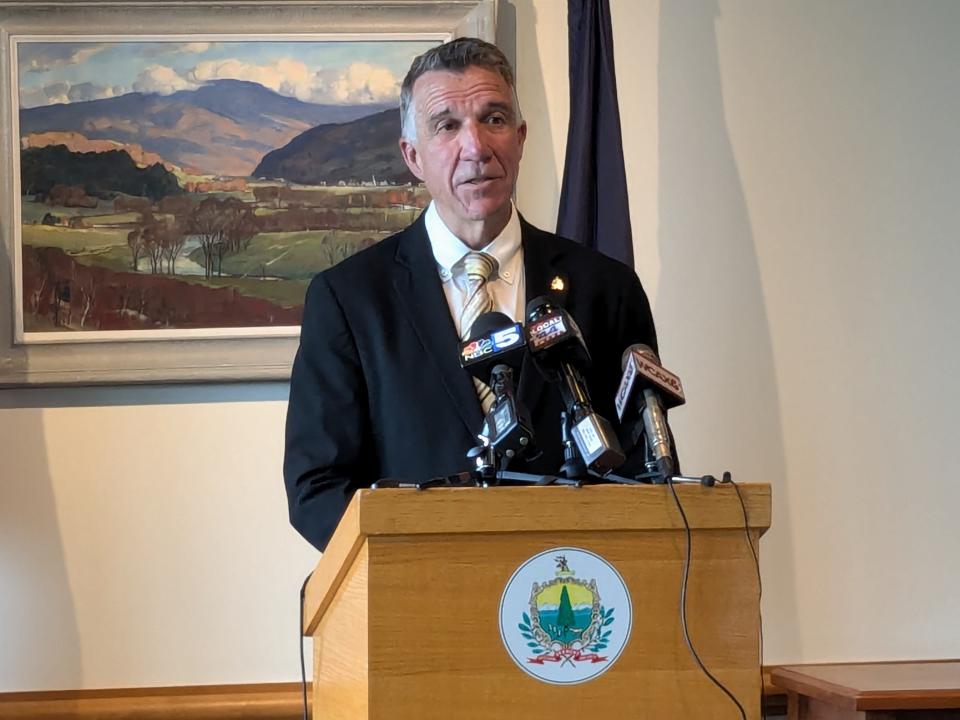Vermont Legislature makes history, overrides six vetoes
Vermont lawmakers made history this week when they overrode six of Gov. Phil Scott’s eight vetoes for the year − including those targeting contentious land development and property tax bills.
House Speaker Jill Krowinski said in a written statement that she took “no pleasure in having to override vetoed bills.”
“The Governor and I have a respectful working relationship and we are able to find legislative compromises often,” Krowinski said. “However, it is our responsibility as a legislative body to do what is right for our state and ensure that Vermonters have access to the programs and systems they rely on.”
The Legislature needs a two-third majority in both the House and Senate to override a veto.
The Legislature overrode five vetoes in 2023, the previous record. Scott, a Republican currently facing a Democrat and Progressive supermajority in Montpelier, has blocked more bills than any Vermont governor in history.
Lawmakers overrode the following vetoes during their session on Monday, June 17:
H.687 – Act 250 and housing updates: Proponents said the bill, which modifies a 50-year-old land use law known as Act 250, would strike a balance between protecting the environment and addressing the state’s severe housing shortage. Scott said the bill was too conservation-focused and argued it would torpedo long-term housing efforts.
H.887 – Property tax increases: The legislation, also called “the yield bill,” sets the statewide education property tax rate at 13.8%. Supporters praised the bill for significantly reducing the projected tax increase, but Scott demanded lawmakers make further cuts to ease the financial burden on Vermonters.
H. 645 – Restorative justice program expansion: The bill increases equitable access to the state’s restorative justice program through the eventual creation of pre-charge and post-charge diversion and adjudication reparative programs. Scott’s lone criticism was that he feared the bill lacked a proper funding source.
H.72 – Overdose prevention center: This legislation funds a pilot overdose prevention center in Burlington – an addiction hot spot in the state – where drugs can be used under supervision and with access to medical care and other services. Scott argued the bill unfairly prioritized Burlington and stripped funding and resources from rural areas.
H.289 – Renewable energy standard: The bill principally requires all state utilities to fully switch to renewable energy by 2035. Scott said the bill would raise utility rates astronomically and that the Department of Public Service had proposed a more affordable alternative.
H.706 – Neonicotinoid pesticides bans: This bill prohibits the distribution or retail sale of seeds treated with neonicotinoids, the most popular type of insecticides in the world, which harm bees, birds and other pollinators. Scott said the bill would harm already vulnerable dairy farmers who depend on the pesticides to survive.
Lawmakers also attempted to override Scott’s veto on H.121, a groundbreaking data privacy and child online safety bill, but failed to secure enough Senate votes. The Legislature did not seek to override Scott’s veto on S.18, which would have banned flavored tobacco products and e-liquids.
'The power has gone to their head': Scott calls for moderation in Statehouse in wake of new override record
Scott condemned the Legislature’s actions late Monday afternoon, saying lawmakers failed to adopt his “common-sense” compromises that he said would have made the bills “more equitable and affordable.”
“Today is a sad day for Vermonters who simply cannot afford further tax burdens and cost increases,” Scott wrote in a news release. “Many will talk about these votes as a major loss for me, but it’s really a major loss for Vermont taxpayers, workers and families.”
The four-term governor doubled down in a press conference the following afternoon, accusing the Legislature of exhibiting “little interest in compromise or taking a moderate approach on almost any issue.”

“I think the power has gotten to their head,” Scott said of the Legislature’s supermajority, whom he described as “a bit arrogant in some respects to the needs of Vermonters.”
Scott also compared lawmakers’ behavior to the culture in Washington, D.C., which is “all about politics” and “leverage.”
“It’s turning into the same thing here, which is unfortunate,” he said.
The solution, Scott argued, is to elect more moderate state senators and representatives – a sentiment that has become a pivotal part of his re-election campaign this year.
“As I’ve said, I feel obligated to be the voice of Vermonters, and I’m sorry that was not enough this year,” Scott said. “At this point we simply need more balance in Montpelier and lawmakers who will put people and communities over their politics.”
When asked if he would support moderate Democrats and Republicans running for state senator and house, he “would be more than happy” to lend his support after the primaries in August.
“We can do better. I know we can,” Scott said.
Megan Stewart is a government accountability reporter for the Burlington Free Press. Contact her at mstewartyounger@gannett.com.
This article originally appeared on Burlington Free Press: Vermont lawmakers override vetoes by Gov. Scott on housing, energy

